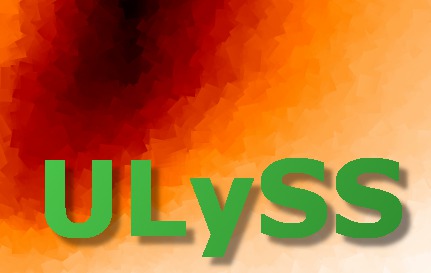
|

|
;+ ; NAME: ; ULY_TGM ; PURPOSE: ; Define a TGM component ; USAGE: ; cmp = uly_tgm(MODEL_FILE=model_file, LSF=lsf_file, ; TG=t_guess, LG=l_guess, ZG=z_guess, ; TL=t_limits, LL=l_limits, ZL=z_limits, ; NAME=name, FIXPAR=fixpar, WL=lim_weight) ; ; KEYWORDS: ; MODEL_FILE Name of the FITS file containing the TGM model, by default ; use: /models/elodie32_flux_tgm.fits. ; ; LSF Name of the file containing a relative LSF to be injected in ; the template. ; ; TG [K] Guess value for the effective temperature (Teff), by ; default = 7000.0. If an array is passed, the analysis will ; be repeated starting from each element to find the optimal ; solution. ; ; LG [cm/s^2] Guess value for the surface gravity (Logg), by ; default = 2.0, it can also be given as an array to search ; the absolute minimum. ; ; ZG [dex] Guess value for the metallicity ([Fe/H]), by ; default = 0.0, it can also be given as an array ; to search the best minimum from the grid of guesses. ; ; TL [K], dblarr(2), limits for the Teff, ; by default = [3100.0,40000.0] see ULY_TGM_INIT. ; ; LL [dex],dblarr(2), limits for the Logg, ; by default = [-0.25, 5.9] see ULY_TGM_INIT. ; ; ZL [dex],dblarr(2), limits for the [Fe/H], ; by default = [-2.5, 1.0] see ULY_TGM_INIT. ; ; NAME A string, name of this component. By default a unique name is ; generated. ; ; FIXPAR An array used to fix some the atmosphere parameters, ; 0 means that the parameter is free, and 1 that it is fixed. ; A fixed parameter keeps its initial value. ; The parameters are specified in the following order: ; (Teff, Logg, [Fe/H]). ; ; WL Limits for the weight of the component [min_w, max_w]. ; The weight is in data units over component units. ; By default the weight is constrained to be positive. ; This constraint is applicable when multiple components are ; fitted (composite spectrum), it is ignored for a single ; component. ; ; /REBIN_COEF Computation mode, see the description below. ; ; DESCRIPTION: ; Return a TGM structure describing a TGM component that can be ; passed to program ULYSS. ; ; TGM stands for Temperature-Gravity-Metallicity: A TGM component ; specifies an interpolated stellar spectrum evaluated as a function ; of its atmospheric parameters (Teff, Logg and [Fe/H]) that was ; interpolated over a stellar spectral library (e.g. ELODIE 3.2) ; or over a grid of synthetic spectra. ; ; The file passed to ULY_TGM contains the coefficients of polynomials ; depending on the atmospheric parameter. Each wavelengh bin is represented ; separately, therefore the coefficients for each term of the development ; form a spectrum. Depending on the interpolator, there are 14 to about ; 25 terms. The first polynomial interpolator was presented in ; Prugniel and Soubiran 2001, A&A 369, 1048 for the ELODIE spectral ; libraries, it was updated in subsequent papers, in particular in ; Wu et al. 2011, A&A 525, 71. Interpolators for the MILES library were ; presented in Prugniel et al. 2011, A&A 531, 169, and Sharma et ; al. 2015, submitted. Other interpolators are available on the ; ULySS site. ; ; The interpolated spectra are evaluated using the interpolator, and ; then rebinned to the WCS of the spectrum to analyse. ; ; REBIN_COEF option: ; Rather than rebinning the interpolated spectrum, it first rebin the ; coefficients, and then compute the interpolated spectrum. This option is ; slightly less precise (because of the spline interpolation of the several ; coefficients), but is in some cases faster. This is the case when (i) ; a series of several spectra are fitted with the same CMP, and (ii) when ; the spectrum to analyse has a sampling much coarser than the interpolator. ; (Note that the impact on the precision of the interpolated spectrum ; is generally fully acceptable; it was the only available option before ; the release 1.3 of ULySS.) ; ; OUTPUT: ; TGM cmp struct, for detailed explanation please check uly_fit.pro ; ; REQUIRED FUNCTION: ; ULY_CMP_NAME ; ; EXAMPLE: ; Fit a CFLIB star: ; cmp = uly_tgm() ; star = uly_root+'/data/cflib_114642.fits' ; ulyss, star, cmp, lmin=3900.0, lmax=6800.0, /PLOT ; ; HISTORY: ; Creation Yue WU 2008/06/18 ; ;- ; CATEGORY: ULY_TGM ;------------------------------------------------------------------------------ function uly_tgm, MODEL_FILE=model_file, $ LSF=lsf_file, $ TL=t_limits, LL=l_limits, ZL=z_limits, $ TG=t_guess, LG=l_guess, ZG=z_guess, $ NAME=name, FIXPAR=fixpar, WL=lim_weight,$ REBIN_COEF=rebin_coef compile_opt idl2 on_error, 2 common uly_path, uly_root if n_elements(model_file) eq 0 then $ model_file = uly_root + '/models/elodie32_flux_tgm.fits' if size(model_file, /TYPE) ne 7 then begin message, 'Argument model_file must be a filename', /INFO return, 0 endif file = strtrim(model_file, 2) if file_test(file) ne 1 then begin file += '.fits' if file_test(file) ne 1 then begin message, 'Argument model_file must be a filename ('+model_file+')', /INFO return, 0 endif endif if n_elements(rebin_coef) eq 0 then rebin_coef = 0 if n_elements(t_guess) eq 0 then t_guess = 7000.0d if n_elements(l_guess) eq 0 then l_guess = 2.0d if n_elements(z_guess) eq 0 then z_guess = 0.0d s_t = size(t_limits) if s_t[0] gt 0 then $ if not s_t[0] eq 2 then $ message, 'The Teff limits have to be of the type arr(2)' s_l = size(l_limits) if s_l[0] gt 0 then $ if not s_l[0] eq 2 then $ message, 'The Logg limits have to be of the type arr(2)' s_z = size(z_limits) if s_z[0] gt 0 then $ if not s_z[0] eq 2 then $ message, 'The metallicity limits have to be of the type arr(2)' s_wl = size(lim_weight) if s_wl[0] gt 0 then $ if not s_wl[0] eq 2 then $ message, 'The weight limits have to be of the type arr(2)' ; create the struct describing TGM component init_data = {model:file, lsf_file:ptr_new(lsf_file), rebin_coef:rebin_coef} descr = '' if n_elements(file) eq 1 then descr += 'model:' + file + ' ' if n_elements(lsf_file) eq 1 then descr += 'lsf:' + lsf_file + ' ' if rebin_coef eq 1 then descr += 'rebin_coef ' namec = uly_cmp_name(name) cmp = {name:namec, $ descr:descr, $ init_fun:'uly_tgm_init', $ init_data:ptr_new(init_data), $ eval_fun:'', $ eval_data:ptr_new(), $ para:ptr_new(/ALLO), $ start:0d, $ step: 0d, $ npix: 0l, $ sampling:-1s, $ mask:ptr_new(), $ weight:0d, $ e_weight:0d, $ l_weight:0d, $ lim_weig:(machar(/DOUBLE)).xmax*[0,1] $ } ; load the parameters and data in the component struct *cmp.para = replicate({name:'', unit:'', guess:ptr_new(), step:1D-2, $ limits:[0d,0d], limited:[1,1], fixed:0S, $ value:0D, error:0D, dispf:''}, $ 3) (*cmp.para)[0].name = 'Teff' (*cmp.para)[0].unit = 'K' (*cmp.para)[0].dispf = 'exp' ; says to display exp(para) (*cmp.para)[1].name = 'Logg' (*cmp.para)[1].unit = 'cm/s2' (*cmp.para)[2].name = 'Fe/H' (*cmp.para)[2].unit = 'dex' if n_elements(t_limits) gt 0 then (*cmp.para)[0].limits = alog(t_limits) if n_elements(l_limits) gt 0 then (*cmp.para)[1].limits = l_limits if n_elements(z_limits) gt 0 then (*cmp.para)[2].limits = z_limits for k=0,2 do (*cmp.para)[k].guess = ptr_new((*cmp.para)[k].limits[0]) if n_elements(t_guess) ge 1 then $ *(*cmp.para)[0].guess = alog(double(string(t_guess))) if n_elements(l_guess) ge 1 then $ *(*cmp.para)[1].guess = double(string(l_guess)) if n_elements(z_guess) ge 1 then $ *(*cmp.para)[2].guess = double(string(z_guess)) (*cmp.para).step = 0.01d (*cmp.para)[0].step = 0.005d ; derivation step in Teff = 0.5 % if n_elements(fixpar) gt 0 then $ (*cmp.para)[0:n_elements(fixpar)-1].fixed = fixpar if n_elements(lim_weight) gt 0 then $ cmp.lim_weig = double(lim_weight) return, cmp end